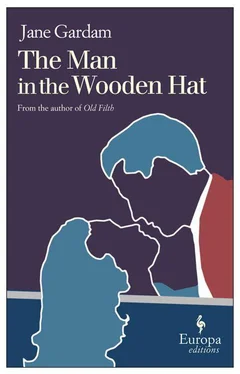“I haven’t a son,” she told the ghost. (“Oh, hello , Tony! Hello, Desmond!”) “I haven’t a child. I’ve no one else to be unwise with. I so love him.”
Dexters was an immediate success. There was very little of the old cowman’s cottage left. All had been enlarged and the garden opened widely to the view. The entrance was no longer the breakneck business of Elisabeth’s first haunted visit and there was electricity, an Aga, a telephone, a splendid kitchen, two bathrooms, a dining room for the rosewood table and a hall wide enough for the red chair. And a terrace, facing the sunset for gin on summer evenings. The great stone chimney remained. Dexters was private and quiet but not so isolated that the two of them would one day become a threat to the social services when they became seriously old. There was a shop half a mile away, the paper and the groceries were delivered, as of yore, and the church stood up unchanging near Dulcie on Privilege Hill. There was a room for Filth to work in surrounded by his shelves of Law Reports, and a hidden garage for one modest car. The almost virgin — if there is such a thing — garden beckoned, and deliveries began of Betty’s plants. A gardener was found and a cleaner who also did laundry. There was the smell of leaves and dew when you opened the windows and the smell of the new wood floors within, and the wood-burning stove. Betty gathered lavender and scattered it in chests of drawers.
And so they settled. The curtains of lights and fireworks and the clamour and glamour and luxury and squalor of Hong Kong were over for them. The sun rose and set less hectically, less noticeably, but more birds sang. The rookery was still there, the nests, now huge and askew, weighing heavily in the branches, the birds — probably, said Filth, the same ones — still disputing and objecting and arbitrating and condemning, passing judgement and gathering further and better particulars. Filth said that so long as they were there he’d never miss his profession.
Memory changed for both Edward and Elisabeth. There were fewer people now to keep it alive. Christmas cards dwindled. Instead, Betty began in October to write letters to the best of those left. Not many. Amy and Isobel and a couple of dotty cousins of Edward. Just as she had rearranged herself into a copy of her dead mother on her marriage, now she began to work on being the wife of a distinguished old man. She took over the church — the vicar was nowhere — and set up committees. She joined a Book Club and found DVDs of glorious old films of their youth. She took up French again and had her finger- and toenails done in Salisbury, her hair quite often in London where she became a member of the University Women’s Club. She knew she still looked sexy. She still had disturbing erotic dreams.
She quite enjoyed the new role, and bought very expensive county clothes, and she wore Veneering’s pearls (Edward’s were in a safe) more and more boldly and with less and less guilt.
As ever, she kept Veneering’s diamond clasp round the back of her neck in the daytime and only risked it round the front at dinner parties where sometimes it was exclaimed over. Filth never seemed to notice.
One day Filth said, “Do you remember that I once took part in an Arbitration at The Hague?”
“The International Court of Justice? Of course I do. I didn’t see you for months. You said it was dreary.”
“That fellow was on the other side.”
“Veneering,” she said. “Yes.”
“We kept our distance. You didn’t come out.”
“I did, actually. Just for a night or two. I met a school-friend in a park. I don’t remember much. It was after we — we married.”
“Well,” he said, looking through his glass of red wine and tipping it about. “I’ve been asked there again.”
“What! It’s been years. .”
“It’s an engineering dispute about a dam in Syria. I’ve done a few dams in my time. The two sides have been rabbiting on, squandering millions. They want to bring in a couple of new arbitrators to sit above the present ones.”
“ Could you? Do you want to? Aren’t you rusty?”
“I could. I’d like to. I don’t think so. Come too. The Hague’s a lovely place and there’s so much around it. There’s Delft and Leyden and Amsterdam and Bruges. Wonderful museums. Paintings. Oh, and good, clean food. Good, clean people. Good for you!”
“I’ll think. But you should do it.”
“Yes. I think so. I think so.”
“The International Court of Justice! At your age.”
“Yes.”
“But,” he said a week later, “it’s out of the question. Guess whom they want as the third replacement arbitrator?”
She licked her fingers. She was making marmalade.
“Easy,” she said. “Sir Terence Veneering QC, Learned in the Law.”
“Yes.”
“Does it matter? Isn’t it about time. .?”
“Well, I suppose so!” said Filth. “And he’s the only other one who knows as much as I do about dams. It would be a fair fight. I needn’t speak to him out of Court.”
“Is he ‘Dams’?”
“Yes. He got the Aswan Dam once. I’d have liked that one. However, I got the dam in Iran. D’you remember? It wouldn’t fill up. Very interesting. They’d moved half the population of the country out and drowned all their villages. I won that. I had death threats there, you know.”
“You always thought so. Will this dam be interesting?”
“ All dams are interesting,” he said, shocked.
Later, eating the new marmalade at breakfast, she said, “But I don’t think I’ll come with you, Filth, my darling. If you don’t mind.”
“Why not?”
“Oh, well. It’s Easter. I’m needed at church. And so on.”
“Dulcie could do all that.”
“Well. No, I’m happy here, Eddie. I’m used to you being away, for goodness sake. It’s not like in East Pakistan with only three telephone lines.”
“Well, I’ll go. Actually”—he gave his crazy embarrassed roar—“I have actually accepted the job so I’ll go and I’ll come back at weekends. I can be back here every Friday night you know, until the Sunday night. And — you never know — you might change your mind and come out to me for a weekend? We could stay somewhere outside The Hague.”
So she was alone in the Donheads through the early spring. It was a bitter Lent, cold and lonely. When Eddie’s car dropped him off at Dexters each Friday night and she had dinner ready for him and news of village matters, he seemed far away and unconcerned.
“Are you enjoying the International Court of Justice?”
“Well, ‘enjoying?’ The creature is still poisonous. Still hates me. But I’m glad to be there. Betty, come out and join me. We can stay away from The Hague and all that. It’s such a chance for you. Buy bulbs.”
“Oh,” she said.
“You can order a million tulips there,” he said.
“Tulips,” she said.
“Well, think about it.”
“I love you, Filth. Oh, yes, well, yes. I’ll come!”
So she went. They stayed in an hotel near Delft and Edward was driven from there to The Hague and back each day, so she saw nothing of the Court.
And the tulip fields were in their glory and she booked for all the tours to see them, sometimes staying overnight, and each time ordering quantities of bulbs for Dorset, to be delivered in October. She talked ceaselessly to other gardeners on the coach tours and on the canal boats, and forgot all else.
She shopped. She bought a broadsword from an antique shop because it reminded her of Rembrandt’s warrior. She bought a blue and white Delft knife with a black blade and broken handle because it might once have cut up fruit in Vermeer’s kitchen. She bought three seventeenth-century tiles for Dulcie — a boy flying a kite, a fat windmill, a boat with square sails gliding through fields — and, for Amy, a heavy copper pot, trying not to think of the postage. She bought a print of a triptych for Mrs. Baxter. She walked for miles — the presents were always delivered back to the hotel — down cobbled streets between tall houses and a central canal. From windows, faces looked out and nodded. These must be homes for the elderly, she thought. What shining, broad faces. They wore round white caps with flaps. She expected Frans Hals at any moment to come flaunting down the street. All just out of sight.
Читать дальше












